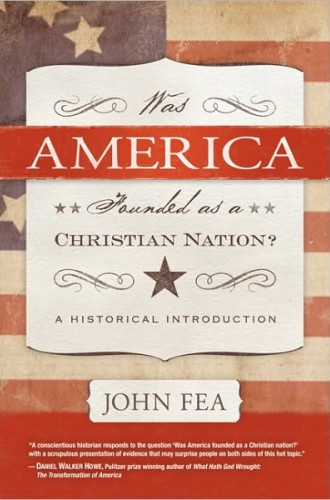Faith of the founders
Was America founded as a Christian nation? No, is John Fea's answer to the question posed in his title. But the answer is yes if we consider how Americans (especially from 1789 to 1865) understood themselves as a Christian nation. And then again, maybe it's just a bad question, Fea concludes, because it arises not from a rich understanding of the past but from present-day polemics. Only when we remove it from that context can we begin to make sense of it.
As chair of the history department at Messiah College, a professing Christian, author of an outstanding book on an 18th-century figure of the "rural Enlightenment" (Philip Vickers Fithian), a frequent public speaker and a tireless blogger at "The Way of Improvement Leads Home" (www.philipvickersfithian.com), Fea is rapidly making a name for himself as a public intellectual who brings the virtues of scholarly humility, patience and objectivity to highly controversial questions of religion and the founding era of American history. This book is a model of scholarly restraint, of patiently working one's way through the sources and of historicizing the questions and terms with which one works.
Read our latest issue or browse back issues.
America was not "founded as a Christian nation," Fea suggests, because its founding documents were those of a fledgling nation-state and not intended as religious statements. The Declaration of Independence was a document of foreign policy aimed at persuading other nations of our independence, and the Constitution was a secular document of governance aimed at shoring up a national government that had proven far too weak during the era of the Articles of Confederation.
Moreover, present-day proponents of the Christian nation thesis (notably self-styled scholars such as David Barton and writers such as Peter Marshall, author of The Light and the Glory) depend heavily on documents that are taken out of context, when they're not fraudulent or made out of whole cloth (such as many quotations and actions whose attribution to George Washington has no basis in fact). Fea points out that while some founding fathers (such as John Jay) held recognizably evangelical Christian beliefs, most of the major founders held a range of beliefs that positioned them as either lukewarm high-church Christians who mainly talked about Providence or rational theists such as Thomas Jefferson, who actively rejected and even ridiculed central Christian doctrines such as the resurrection of Christ.
Then again, yes, America was founded as a Christian nation, Fea argues. For example, nearly every individual state (but not Virginia) enacted a state constitution that made it "very clear that they were Christian societies, placing Protestant qualifications on office holding and allowing government to tax citizens for the purpose of promoting the Christian religion." Moreover, Americans of the founding era, even including those far outside the bounds of Christian orthodoxy, trusted that "religion was necessary in order to sustain an ordered and virtuous republic."
During the Second Great Awakening in the 19th century, when evangelicalism rose to become a dominant form of religious expression, many Americans assumed a Protestant base to American culture. In the words of historian David Sehat, they created an informal but powerful "moral establishment" that in some ways wielded more power than any national legal establishment of religion would have. The religion clauses of the First Amendment ("Congress shall make no law respecting an establishment of religion, or prohibiting the free exercise thereof") ruled out any legal establishment at the national level. But Americans exercised the free-exercise clause freely, inventing a bewildering array of new denominations, missionary societies, publication boards and religions throughout the 19th century, making America a Christian nation in demography if not in law.
Thomas Jefferson had dreamed of a rationalist republic; what he got instead was a Methodist millennium. In many ways, the idea of America as a Christian nation, as put forward by its current proponents, was an invention not of the founding era but of the 19th century. In other words, the phrase Christian nation as used in Fea's title itself has a history, one that underwent significant changes and transformations between the era of Franklin and the era of Falwell.
But most important, Fea suggests, the question "Was America founded as a Christian nation?" is badly posed. The question is ahistorical because it presupposes a stable set of terms (such as nation, founding and Christian) that in fact are historically contingent and must be understood within the context of their own time and place. Fea's most important original intention is to give readers a lesson in historical thinking—a lesson on the strangeness and distantness of the past in relation to our own preconceptions and concerns.
For example, the famous Treaty of Tripoli in 1797 assured the Muslim states of the Barbary Coast that "the Government of the United States of America is not, in any sense, founded on the Christian religion"; no religious differences between the United States and Tripoli would come between a necessary and important trade agreement protecting American ships from piracy. The treaty stated a historical truth about the Constitution. Americans, however, viewed the contest between the United States and the Barbary nations as a holy war, avidly read captivity narratives describing Christians being forced to convert to Islam and characterized Muslims as "children of Ishmael" who threatened Christian civilization. In short, in spite of the secularism of the founding documents, many Americans from the Revolution to the Civil War did understand themselves to be citizens of a Christian nation.
Of course, those same Americans disagreed vehemently on what constituted a Christian nation, hence the denominational splits, religious vituperation and the bloody Armageddon of the Civil War. And since then Americans have continued their disagreements.
Fea tells this story with consummate skill and evenhandedness. However, his evenhandedness sometimes seems to suggest points of controversy where there aren't any (not unlike the Obama "birther controversy"). In the present day, even advocates of the "godless Constitution" viewpoint (such as historians Isaac Kramnick and R. Laurence Moore) fully understand the deep religious base of American history. They suggest not an exclusion of religion from the public square but simply an avoidance of any special privileges for it. David Barton and the Christian nationalists, by contrast, have some legitimate points (fully credited by Fea), but they also peddle a large number of outright falsehoods. Perhaps more important, they actively and unapologetically use and distort history in precisely the ways that Fea warns against in his introductory chapter, titled "How to Think Historically."
The Christian nation debate is not really an intellectual contest between legitimate contending viewpoints; it is instead a manufactured controversy akin to the global warming debate. On one side are purveyors of a rich and complex view of the past (including most historians who have written about the founding era). On the other side is a group of ideological cranks who have created an alternate intellectual universe based on a historical fundamentalism. In their drive to create a usable past, they show little respect for how the past is a "foreign country."







